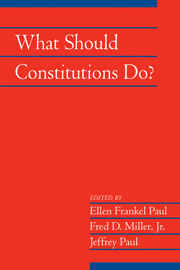Book contents
- Frontmatter
- Contents
- Introduction
- Acknowledgments
- Contributors
- What Are Constitutions, and What Should (and Can) They Do?
- Constitution and Fundamental Law: The Lesson of Classical Athens
- Contract, Covenant, Constitution
- Constitutionalism in the Age of Terror
- The Liberal Constitution and Foreign Affairs
- Do Constitutions Have a Point? Reflections on “Parchment Barriers” and Preambles
- The Origins of an Independent Judiciary in New York, 1621-1777
- Foot Voting, Political Ignorance, and Constitutional Design
- Pluralist Constitutionalism
- Deliberative Democracy and Constitutions
- The Constitution of Nondomination
- Can We Design an Optimal Constitution? Of Structural Ambiguity and Rights Clarity
- Index
What Are Constitutions, and What Should (and Can) They Do?
Published online by Cambridge University Press: 05 June 2012
- Frontmatter
- Contents
- Introduction
- Acknowledgments
- Contributors
- What Are Constitutions, and What Should (and Can) They Do?
- Constitution and Fundamental Law: The Lesson of Classical Athens
- Contract, Covenant, Constitution
- Constitutionalism in the Age of Terror
- The Liberal Constitution and Foreign Affairs
- Do Constitutions Have a Point? Reflections on “Parchment Barriers” and Preambles
- The Origins of an Independent Judiciary in New York, 1621-1777
- Foot Voting, Political Ignorance, and Constitutional Design
- Pluralist Constitutionalism
- Deliberative Democracy and Constitutions
- The Constitution of Nondomination
- Can We Design an Optimal Constitution? Of Structural Ambiguity and Rights Clarity
- Index
Summary
INTRODUCTION
A constitution is, as Article VI of the United States Constitution declares, the fundamental law of the land, supreme as a legal matter over any other nonconstitutional law. But that almost banal statement raises a number of theoretically vexed issues. What is law? How is constitutional law to be distinguished from nonconstitutional law? How do morality and moral rights fit into the picture? And what are the implications of the answers to these questions for questions regarding how and by whom constitutions should be interpreted? These are the issues that I shall address.
I proceed as follows: In Section II, I take up law's principal function of settling controversies over what we are morally obligated to do. In Section III, I relate law's settlement function to the role of constitutional law. In particular, I discuss how constitutional law is distinguished from ordinary law. I also discuss the role of constitutions in establishing basic governmental structures and enforcing certain moral rights. In Section IV, I address the topic of constitutional interpretation, and in Section V the topic of judicial review. Finally, in Section VI, I discuss constitutional change, both change that occurs through a constitution's own rules for amendments and change that is the product of constitutional misinterpretations and revolutions.
LAW AND THE SETTLEMENT OF MORAL CONTROVERSY
What is the principal function of law–all law? I would argue, and have argued, that law's principal function is to settle what we are obligated to do.
- Type
- Chapter
- Information
- What Should Constitutions Do? , pp. 1 - 24Publisher: Cambridge University PressPrint publication year: 2011
- 3
- Cited by

